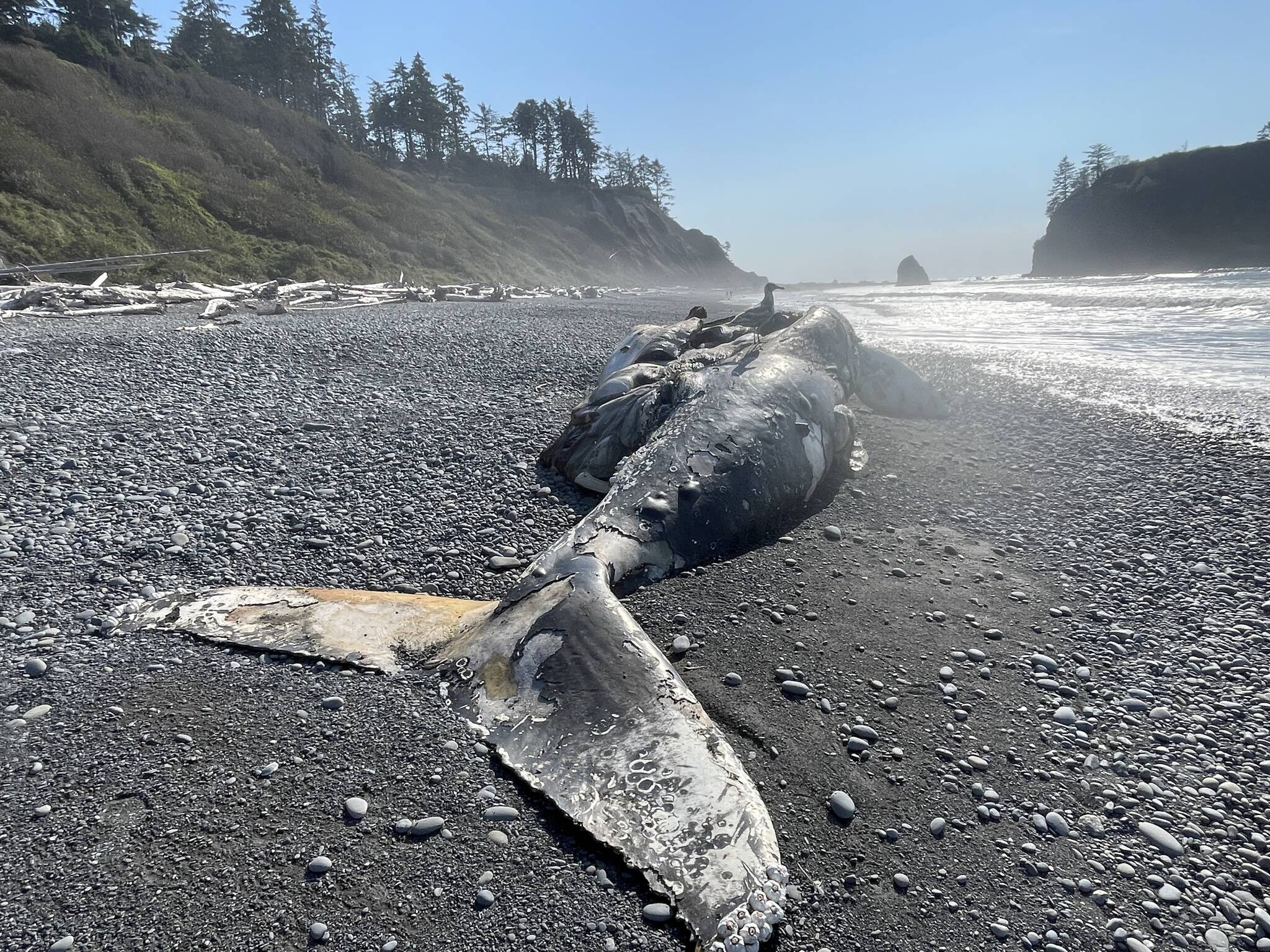From a distance, if someone wasn’t sure what they were looking for north of Ruby Beach, the whale’s body could just be another rock jutting out of the sand on a beach speckled with them.
But up close, the smell of putrefaction is unmistakable, a scent like a fishhook to the nostrils, at odds with the sunny Saturday on the shore.
The whale, a female yearling humpback, was reported on Oct. 5 after washing ashore, according to the news release by the Olympia-based Cascadia Research Collective. The young female, likely a recently weaned calf, had severe bruising, internal bleeding and other trauma likely resulting from a ship strike, according to the news release.
“We strongly suspect vessel collision. There’s not a lot that could cause that kind of trauma in a whale,” said Jessie Huggins, stranding coordinator for the Cascadia Research Collective. “The internal injuries were stemming from the right shoulder area. We did cut it open to see what was happening.”
Up close, the rot and ruptured flesh from the necropsy is obvious. Flies swarm around the carcass, along with one particularly stubborn shorebird, making a meal out of the juvenile whale. Barnacles cluster on parts of the carcass, bright against the dark skin of the 26-foot mammal. The whale will decompose over the next several months, Huggins said, accelerated as scavengers gnaw and tear at the carcass for sustenance.
birb
“It’s the whole circle of life thing,” Huggins said.
Huggins said the flesh would likely be gone within a few months.
“It goes a lot faster in the winter. You get the storms that come in and the really high tides. When the tides come in and cover it, you get the crabs,” Huggins said. “There’s a lot of things feeding on it, aquatic and terrestrial.”
Huggins estimated the whale weighed about 7,500 kg or about 8.3 tons. The carcass will be left to rest where it washed ashore, said Meagan Huff, the public affairs specialist for the Olympic National Park, its mass nourishing the local environment.
“It will be left to decompose to be eaten by other animals and organisms as part of the ecosystem,” Huff said in a phone interview.
Touching or removing parts of the whale is against federal law, Huff said.
“It would be best if people avoided the whale. It is illegal to remove marine mammal parts without a research permit,” Huff said. “Please avoid the whale. Do not touch the whale. Do not take things from the whale.”
bird
A rise in ship strikes
At the same time as the humpback was washing ashore at Ruby Beach, further north, a minke whale, an adult female, was found dead and floating in the San Juan Islands. The whale had severe bruising alongside broken vertebrae and ribs, likely from a ship strike, according to the news release. The coastal regions of Washington, including Grays Harbor as well as beaches north and south, are frequent sites of whale carcasses and other marine mammals washing ashore, Huggins said.
“We have seen an increase in ship strikes over the last 30 years or so,” Huggins said.
Many of these are never documented because they occur unobserved at sea and the carcass sinks to the ocean bottom without washing ashore, where they’re more easily observed.
“We see more gray whales because they’re closer to the shorelines,” Huggins said. “If they’re further offshore they’re more likely to die and get scavenged by sharks and never wash up.”
barnacles
Gray whales in particular are dying at a far higher rate than normal, Huggins said.
“It’s an Unusual Mortality Event for gray whales. It’s been ongoing since 2019,” Huggins said. “There’s a multicountry, multiregion investigation that’s ongoing.”
For whales, the crowded shipping lanes could be leading to the increase in strikes, Huggins said.
“If they’re feeding in areas where there’s a lot of general shipping noise, it can be difficult to tell where that noise is coming from,” Huggins said. “It’s an awfully noisy ocean.”
To report a dead, injured or stranded marine mammal anywhere in Washington state or the West Coast, call the West Coast Marine Mammal Stranding Hotline at 1-866-767-6114.
“Report any strandings,” Huggins said. “It helps with our research. We can find out what’s normal and what’s not.”
Contact reporter Michael S. Lockett at (757) 621-1197 or mlockett@thedailyworld.com.



